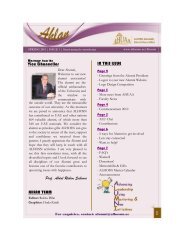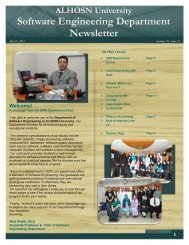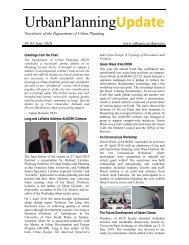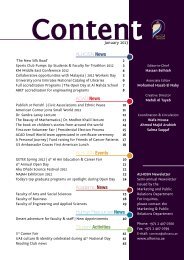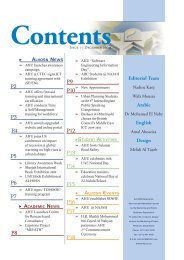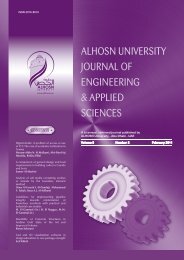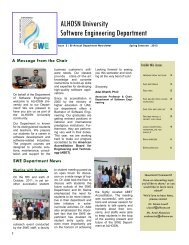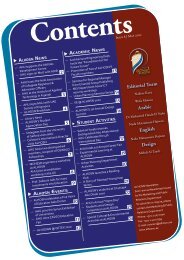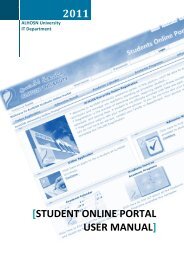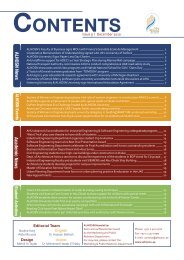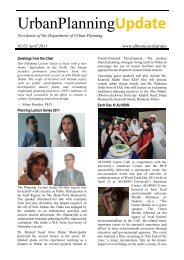ALHOSN University Catalogue Global Knowledge with Local Vision ...
ALHOSN University Catalogue Global Knowledge with Local Vision ...
ALHOSN University Catalogue Global Knowledge with Local Vision ...
You also want an ePaper? Increase the reach of your titles
YUMPU automatically turns print PDFs into web optimized ePapers that Google loves.
MEC 443 Fluid Power Systems (3 = 3 + 0)<br />
Prerequisite: MEC 323<br />
The course reviews relevant fluid mechanics principles and proceeds <strong>with</strong> treatments of individual components.<br />
Discussions of individual components include principles of operation, mathematical models, and design<br />
considerations. The course will cover: Fluid power circuit diagrams: valves, pumps, actuators, filters, intensifiers,<br />
reservoirs, accumulators. Design of positive displacement pumps. Analysis of fluid leakage, hydrostatic<br />
transmissions, hydraulic stiffness, and performance of positive displacement pumps and actuators.<br />
MEC 444 Sustainable And Alternative Energy Technologies (3 = 3 + 0)<br />
Prerequisite: MEC 324<br />
This course covers descriptions of systems and design issues and parameters, including performance, operating<br />
characteristics, reliability, small-scale hydraulic energy, tidal and wave energy, solar energy systems, including<br />
photovoltaics and thermal systems, wind energy systems, biomass energy, district energy, and hydrogen energy<br />
systems, including production, storage, transport and utilization technologies. Topics in fuel cells include fuel<br />
cell thermodynamics, electrode kinetics, and types, including proton exchange membrane and solid oxide fuel<br />
cells. Topics in energy storage include thermal, compressed air and battery storage, geothermal energy systems,<br />
magnetohydrodynamics, thermoelectrics, and thermionics.<br />
Concentration 2: Instrumentation and Control<br />
MEC 450 Mechanical Vibration and Control (3 = 2 + 1)<br />
Prerequisite: MEC 322<br />
This course is an introduction to modeling and oscillatory response analysis for discrete and continuous<br />
mechanical and structural systems. Fundamental aspects of mechanical vibrations, types and causes of various<br />
vibratory motions, the concepts of mathematical modeling of the vibratory systems and model elements including<br />
mass/inertia, spring and damper elements and their corresponding describing equations are studied. Various<br />
vibration control concepts and techniques are presented including vibration isolation, vibration absorption and<br />
balancing to reduce the intensity of the source of excitation. MATLAB software will be used by the students<br />
to implement numerical techniques in solving dynamics and vibrations problems.<br />
MEC 454 Maintenance and Reliability (3 = 3 + 0)<br />
Prerequisite: FES 202<br />
This course provides students <strong>with</strong> reliability analysis tools and techniques for designing and operating systems<br />
<strong>with</strong> high reliability and introduces reliability engineering and risk assessment for engineering systems. The<br />
course helps prepare the student to understand and anticipate the possible causes of failures, and provides them<br />
<strong>with</strong> the knowledge on how to prevent them. Topics include reliability functions, reliability distributions, analysis<br />
of failure data, reliability of systems, probabilistic risk assessment, design for reliability, maintenance, reliability<br />
testing and organizational aspects of engineering system safety.<br />
MEC 455 Mechanical Engineering Metrology (3 = 2 + 1)<br />
Prerequisite: MEC 322<br />
The course introduces the students to the principals involved in and the various instruments and modern machines<br />
used for measuring dimensional features such as length, angle, flatness and roundness. Thread Metrology. Surface<br />
roughness and measurements, flow, temperature, basic electrical measurements and sensing device, force, torque<br />
and strain measurements, design of load cells are also explored. This course investigates general concepts of<br />
measurement systems, classification of sensors and sensor types, interfacing concepts, data acquisition,<br />
manipulation, transmission, and recording. The course utilizes LABVIEW, applications, a team project on design,<br />
and implementation of a measuring device.<br />
MEC 456 Engineering Acoustics and Noise Control (3 = 2 + 1)<br />
Prerequisite: MEC 322<br />
Theory and practice in the analysis and measurement of sound and vibration as applied to noise control. Basic<br />
concepts of vibration and acoustic theory are developed, and a variety of sound and vibration measuring<br />
equipment is used in laboratory experiments. Practical aspects of noise control as applied to products, machinery,<br />
buildings, vehicles, and other systems. Topics include sound propagation, sound in small and large enclosures, and<br />
design of enclosures, ducts, and mufflers, isolation and damping.<br />
Concentration 3: Materials and Manufacturing<br />
MEC 472 Advanced Manufacturing Processes (3 = 3 + 0)<br />
122



